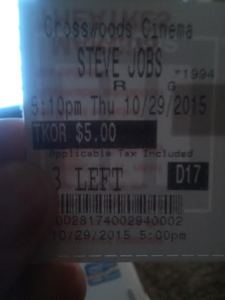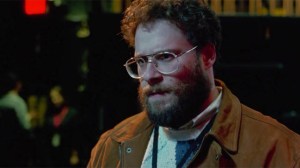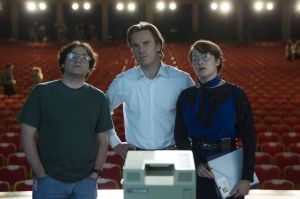“Things don’t become so because you say so.”
If LeBron James can come home, so can Steve Jobs. Mr. Jobs was the co-founder, businessman, CEO, and revolutionary spearhead of Apple, Inc. For all intents and purposes, he was Apple. Drawing inspiration from individuals like Alan Turing, Jobs has left the world with lasting contributions.
In 1984, Jobs and Apple ready themselves for the launch of the Apple Macintosh. Four years later, he himself stands out on his own with his latest contribution to society. Ten years after that, Steve returns to what he created to showcase the technology that really launched Apple into what is known today. Throughout all of these conference reveals, there is more than just the latest technology at hand. Behind the scenes show the real man, a difficult but brilliant intellectual who wasn’t the easiest of people to get along with, from friends and co-workers to estranged family. As Aristotle once put it, “No great mind has ever existed without a touch of madness.”
If the Steve Jobs biographic of 2013 were more well-received, there would probably be a lot of fatigue and anonymity toward Hollywood for releasing yet another film (not counting the numerous documentaries and what not) about the life and times of Steve Jobs. For 2015’s Steve Jobs, it has the benefit of better writing (Aaron Sorkin), a there-but-not-distracting directorial style (Danny Boyle), and a more respected cast, starting with Michael Fassbender.
Honestly, 2013’s Jobs and 2015’s film only share the titular character as far as similarities go. Though technically a biography, Boyle and Sorkin’s effort is really a semi-fictionalized drama simply featuring a well-known real-life individual and company, even confirmed by Sorkin. Narrative-wise, this isn’t a telling of Jobs’ life from boot-up to shut-down. Rather, its structure is akin to Selma, in that it features a key piece—in this case pieces—of the subject’s life.
For yours truly, the structure is pretty good and refreshing from many character biographies, if obviously a little repetitive. There’s a meta-line in the final act that is uttered by the titular character that basically affirms the formula that the audience has witnessed for the two hours. It elicited a laugh in my theater. Again, though repetitive, the story structure isn’t that big of a problem, but the ending kind of is. It suffers in its resolute determination to make everything tidy. I won’t say that it is necessarily forced per se, but from how Jobs is shown in the first two and even part of the final act to the last few minutes of the movie is kind of jarring. Maybe it was just me, or maybe it was the lowkey bad choice of music that would have felt right in an 80’s movie ending.
What Boyle and Sorkin do get right, however, is the writing. Their version of the Apple figurehead and everyone that surrounds him is filled with dialogue, which, for many movies, could amount to a mundane watch. Luckily, Sorkin, as evidenced by his work on television and other cinematic works, has a way with words. The words that come out of these characters’ mouths are natural (as natural as hearing computer geniuses talk about computer jargon could be, that is), but most of all, their words are compelling.
The lack of a traditional biopic structure withstanding, Sorkin still manages to still give some backstory to the main character. Because he’s so good at injecting this backstory, it makes the flashbacks used by Boyle overkill, in my honest opinion. Aside from one, they don’t really add anything except for seeing Jobs and others as younger individuals. It’s the only misstep in the direction. The real directorial highlight of it is how the clarity of the picture reflects the time period, moving from what feels like an analog presentation to a more up-to-date rendering of today’s quality of technology. The score seems to follow suit as well, very digitized initially and then becoming more traditional as the runtime goes on.
Michael Fassbender may not have been the first choice to play Jobs, but considering the overturn of directors and actors attached to the feature, he is pretty damn good, perhaps even Oscar-worthy. Despite being a little iffy in the resemblance factor, Fassbender does so well that if one had no idea on what Jobs looked like, it wouldn’t be farfetched to imagine showing them this movie, telling them this was the actual Steve Jobs, and them believe it. Maybe it’s not that crazy, but what yours truly is trying to say is that he nails the arrogance and pure complexity that many have gone on record to say Jobs possessed. What’s great is that Fassbender is not trying to win over the audience, he’s perfectly fine and in control in playing an asshole. A gifted genius, sure, but essentially an asshole. Looking for a likable lead? Not found in this one.
Where the real fun of the movie exists is in those verbal battles in which Jobs is clashing with Apple co-founder Steve Wozniak (Seth Rogen), computer engineer Andy “the other Andy” Hertzfeld (Michael Stuhlbarg), marketing executive Joanna Hoffman (Kate Winslet), and CEO John Sculley (Jeff Daniels). Though Jobs is unquestionably the man, each character he spars with is afforded the opportunity to basically tell him how they feel. These moments aren’t fleeting, they make up the crux of Steve Jobs, and just about all of the cast, save for maybe the daughters, are superb in their characters’ respective moments.
For many years, “Think Different” was the slogan for Apple. In a way, it can be used to summarize the 2015 version of Steve Jobs as it pertains to how a “biopic” is presented and structured. It might not be the complete in-depth beginning-to-end story of Jobs’ life, but there are documentaries and other films that do that. If looking for more of an “inspired by” approach compared to a “based on” one, Sorkin and Boyle’s version is programmed to satisfy that desire.
Grade: B
Photo credits go to consequenceofsound.net, Variety.com, and Esquire.com.
Follow the Movie Man @MovieManJackson





Dude this is an outstanding review, this actually makes me more excited about this movie. I left it feeling something close to indifferent (ha!) aside from Michael Fassender’s absolutely amazing performance. This was a guy who’s introduced to us as an almost irredeemable jerk and by the end, even if he’s even more vindictive and controlling as CEO, I found myself still getting the chills knowing what he has done.
I think it’s telling in one scene where he says “I’m not made well.” That kind of told me his mind literally can’t think of anytig other than the practical knowledge of how computers will be successful and his awkwardness with society on a smaller scale. He so couldn’t relate to his only family. He’s kind of a tragic character.
Appreciate it Tom! I was really into the movie, loved the dialogue. But the last few minutes, even with that great line by Jobs, kind of brought it down in my book. Man, it felt so sappy and insistent on tying up loose ends.
But, the acting was great all around, great writing and direction. I can see where some people might get mad with an artistically-inspired take, but if you want something more true to life, there are many works out there that do that.
Yeah I think I’m in the same boat. The ending was problematic for me too. Even if he made nice with his daughter in reality I doubt he would have done it that way.
I felt the same way, Well written and acted but a little repeitive. I’d recommend the documenatry “Steve Jobs: The Man in the Machine”. It’s extremely good.
So I’ve heard! I think I remember you writing on it.
This looks dreadful, but your review seems pretty positive. I agree that Fassbender seems like a wrong choice, you say he’s good, so maybe I’ll give it a shot.
Please do, David. Though this surprised in a bad way with how little money it made at the box office, this is still likely to be in the Oscar buzz throughout the next few months. Better to get exposed now! Thanks for stopping by.
I may keep it on my list. It feels kinda like Oscar bait. Ha.
Love this review!! I literally just saw this last night (yes, I’m not only behind on reading reviews but the actual movies & didn’t want to have spoilers etc..you know how I am 🙂 ) with Aaron Sorkin & Danny Boyle Q & A moderated by one of my favs..Kathryn Bigelow. They truly, i’m not joking – made the almost same points as you did on the film..about everything..I’m not kidding.. Are you a psychic?? hahahahahha
Maybe I am 😉 But I found Jobs to feature great dialogue, of course it was kind of repetitive story structure-wise. But I believe the cast knocked it out of the park, and I think Fassbender, even with the underperformance at the box office, deserves a Best Actor nom.